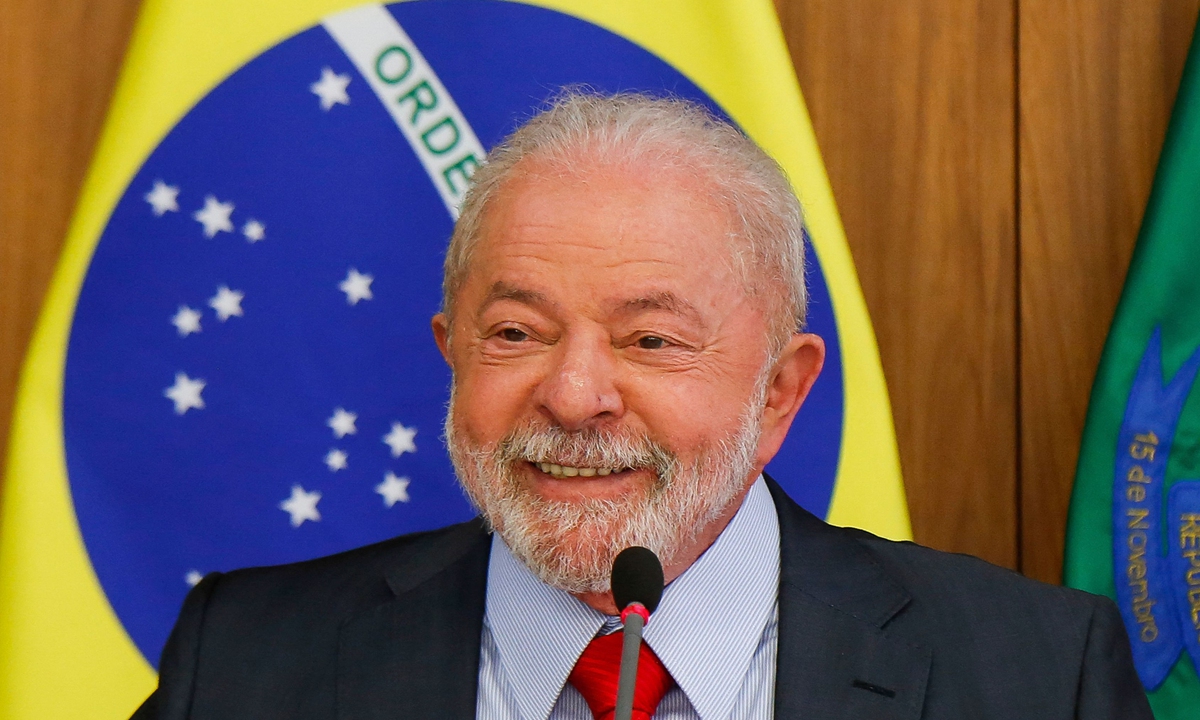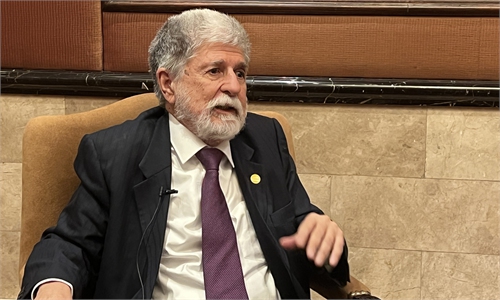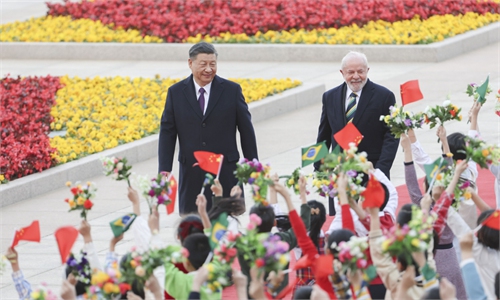While Lula continues to advocate for 'strategic autonomy,' what is Baerbock hesitating for?

Brazilian President Luiz Inácio Lula da Silva Photo: VCG
Brazilian President Luiz Inacio Lula da Silva's visit to Huawei, the most despised Chinese company in the US, is widely seen as a signal of distancing himself from the US and his efforts to maintain Brazil's strategic independence. Not only is Huawei used throughout Brazil, but also 27 percent of Brazilian exports are targeted at the Chinese market, more than it exports to the US. Why should Brazil listen to the US on issues related to China?
Former Brazilian president Jair Bolsonaro's rhetoric toward China was harsh and confrontational, with statements on Huawei and the pandemic that followed the US' lead, almost as if he wanted to be in lockstep with them. However, during his presidency, China-Brazil trade almost doubled; Huawei expanded its presence in Brazil; China promoted its vaccines in Brazil; and Brazilian soybeans, minerals, and beef sold well in China. Regarding actual results, Bolsonaro, who talked tough on China, became one of the most pro-China Brazilian presidents.
South America, where Brazil is located, is considered by the US as its "backyard," but China has developed stronger relations with it, as China's true attractiveness has played a role. Brazil is the largest country in South America in terms of area, population and GDP, and it is also the world's ninth-largest economy. Nothing can stop it from getting closer to China. Now that left-wing President Lula is back, he is bound to strengthen the China-Brazil relationship further.
It is worth mentioning that the Lula administration cannot be considered "pro-China," and neither can the whole of Brazil. In February, Lula visited the US, seeking a balanced foreign policy between China and the US. Balance means being friendly and cooperating with both China and the US, and not taking sides that harm Brazil's interests.
Therefore, Brazil's relationship with China is truly normal, with strong sustainability. Even if a right-wing president comes along one day and starts to echo the US in criticizing China, Brazil's national interests will be quite compelling, demanding a more natural approach to its relations with China.
The case of Brazil reminds me of Germany today. After former chancellor Angela Merkel left, the new government became a "hodgepodge." Current German Chancellor Olaf Scholz is from the Social Democratic Party and has a relatively rational attitude toward China. But German Foreign Minister Annalena Baerbock is from the Green Party and has a stronger ideological preference.
Baerbock sometimes mentions Xinjiang and "human rights," sometimes Taiwan, and sometimes "getting rid of dependence on China." She is visiting China at the moment, and according to Western media reports, she wants to "clarify" Germany's and the EU's attitude toward China, because Macron has just stated that Taiwan "is not our crisis" and emphasized Europe's "strategic autonomy," which triggered a big debate on China relations in Europe and the West.
Scholz briefly declared his China policy during his visit to China last November, stating, "We don't want to decouple from China, but can't be over-reliant." Baerbock echoed similar sentiments in Brussels on April 5: "We should de-risk our relations with China. It doesn't mean decoupling from China, but we must reduce one-sided dependencies," she said.
To make Germany "decouple" from China? This idea is too unrealistic. Even as tough as Baerbock is, she would first have to dismiss this goal. As for reducing unilateral dependence on China, first, China has no intention to make Germany and the EU "depend on" us. China does not want to depend on other countries either. So we need to import oil from multiple sources and buy soybeans from the US, Brazil, Argentina, and Russia.
Baerbock called for the development of other Asian markets. China will not stop that because it involves the freedom of German companies. The problem is that China's market is bigger than all other Asian countries. Volkswagen Group sells 40 percent of its cars in China, while for other major German car manufacturers the range is also 30 to 40 percent. ASEAN has a small population. India has a large population, but tuk-tuks are still quite popular there. Germany's Mercedes-Benz and BMW cannot be big sellers in those countries. In addition, other countries can import the largest variety of goods from China in the most cost-effective way. Germany's massive imports from China are also the result of the laws of the free market.
A new broom sweeps clean. When a new government takes office, it is the easiest time for them to "talk tough." However, Germany has no actual geopolitical conflict with China and is a large economy. The logic of its policy toward China will not be very far from Brazil and will be similar to its neighbor France. So while Macron wrote, "Long live the friendship between France and China!" in various languages, and Lula came to China with a huge group of business executives, if Baerbock wants to highlight values diplomacy, I think the Chinese people should understand it and give her the necessary respect so that she won't find herself in an awkward situation. At the same time, we have to be confident: No matter what the current German leaders say, the general logic of the country's China policy will not change significantly.
The author is a commentator with the Global Times. opinion@globaltimes.com.cn



